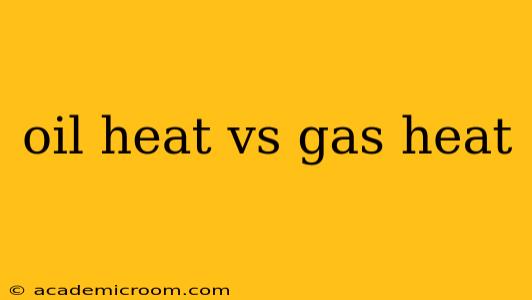Choosing the right heating system for your home is a significant decision, impacting both your comfort and your wallet. Two of the most popular options are oil and gas heating systems. This in-depth comparison will help you weigh the pros and cons of each, ultimately guiding you toward the best choice for your specific needs and circumstances.
What are the Differences Between Oil and Gas Heating Systems?
The fundamental difference lies in the fuel source: oil furnaces burn fuel oil, while gas furnaces use natural gas or propane. This seemingly simple distinction leads to a cascade of other differences in terms of cost, efficiency, environmental impact, and maintenance.
How Much Does it Cost to Heat With Oil vs. Gas?
This is often the most pressing question. The cost of heating with oil versus gas is highly variable and depends on several factors, including:
- Fuel prices: The price of oil and natural gas fluctuates significantly based on global markets and seasonal demand. Historically, oil prices have shown greater volatility than natural gas prices.
- Heating system efficiency: A more efficient furnace, regardless of fuel type, will save you money. Look for systems with high AFUE (Annual Fuel Utilization Efficiency) ratings.
- Home insulation and size: A well-insulated home will require less energy to heat, regardless of the fuel source. Larger homes naturally consume more fuel.
- Climate: Colder climates naturally necessitate more heating, increasing fuel consumption.
Generally, natural gas is often considered the more cost-effective option in regions where it's readily available. However, localized pricing variations can sometimes make oil a competitive alternative. It's crucial to obtain current price quotes from local suppliers to accurately assess the costs for your area.
Which is More Environmentally Friendly, Oil or Gas?
Both oil and natural gas contribute to greenhouse gas emissions. However, natural gas generally produces fewer emissions per unit of energy generated compared to oil. Propane, another option for gas heating, offers slightly lower emissions than natural gas. The environmental impact also depends on the efficiency of your heating system. A highly efficient furnace will minimize emissions regardless of the fuel source.
What are the Maintenance Requirements for Oil and Gas Furnaces?
Both systems require regular maintenance to operate efficiently and safely. Oil furnaces typically require annual servicing, including cleaning the burner, checking the fuel pump, and inspecting the venting system. Gas furnaces also need annual inspections, focusing on cleaning the burners, checking the heat exchanger, and verifying proper gas flow. Neglecting maintenance can lead to reduced efficiency, increased costs, and potential safety hazards.
What is the lifespan of an oil furnace compared to a gas furnace?
Both oil and gas furnaces can have a lifespan of 15-20 years or more, depending on usage, maintenance, and the quality of the unit. However, with proper care and maintenance, both can provide reliable service for an extended period.
What are the safety concerns associated with oil and gas heating systems?
Both oil and gas heating systems present potential safety hazards if not properly installed, maintained, and operated. Oil systems involve the handling of flammable liquids and require careful attention to ventilation to prevent carbon monoxide buildup. Gas systems also present a risk of gas leaks and carbon monoxide poisoning, necessitating regular inspections and the installation of carbon monoxide detectors.
Is one type of heating system better for the environment?
While natural gas generally produces fewer greenhouse gas emissions per unit of energy than oil, the environmental impact of both depends on factors like extraction methods, fuel efficiency, and overall energy consumption. Heat pumps and other renewable heating options are becoming increasingly popular as more environmentally friendly alternatives.
Which type of heating system is easier to install?
The installation complexity of both oil and gas systems depends on factors such as the existing infrastructure, the size of the house, and local building codes. Generally, gas connections are often simpler to install than oil delivery systems.
This comprehensive comparison provides a solid foundation for making an informed decision. Remember to consult with qualified HVAC professionals in your area to assess your specific needs and determine the best heating system for your home and budget. They can provide accurate cost estimates and ensure proper installation and maintenance.
